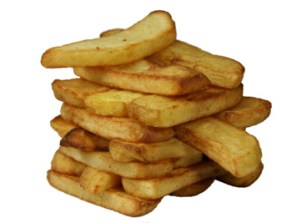Chip Jenga – Playing with Scotland’s Health
- Published
- in Health
Every August I spend a couple of weeks at the Edinburgh Festival, taking in the best Arts festival in the world. There’s not much to learn about healthcare amongst the 2,000 different productions, but it’s an interesting opportunity to look around the City to see how healthcare initiatives in Scotland are developing.
Scotland is an interesting country in terms of health, as it contains a number of anomalies. At one end of the spectrum it boasts some of the best examples of Telecare and Assisted Living practice anywhere in the world. In the middle are some excellent preventative initiatives. And at the other end it has issues with lifestyle and diet that are propelling its population towards an increasingly unhealthy future
The issue of diet is a long-standing one that starts at an early age. Whereas England is embracing chefs like Jamie Oliver who are leading high profile campaigns to improve the quality of school meals, Scotland largely ignores them. If you’re in Scotland at lunch time, you’ll see queues of school kids outside the local chippies and bakers downing their daily intake of carbohydrates as they start on the route to weight related health problems. For most, lunchtime means a trip to the local obesiary, which is typically Greggs – the chain of bakers who feed a large percentage of the population.

Festival time and the influx of non-Scots appetites don’t have a noticeable effect on the traditional catering preferences. When you’re eating in Edinburgh, it’s Chips with everything (which was sadly not being performed this year). Try and order something without chips and you’ll be met with a stare of incredulity. Even if they take the order, the chance is that your plate will still arrive with at least half of its surface concealed with a pile of deep fried potato.
What I hadn’t noticed before was an observation made by Marcus Brigstocke during his excellent rumination on his God shaped hole, which is that the local Fish and Chip shop (chippy) next to the flat he was living in also sold Rennies. I don’t know whether Rennies are an international brand, but for those unfamiliar with them, they’re the UK’s best known indigestion remedy. There’s a rather inevitable irony abut the coupling. Instead of reducing their portion sizes, the local fast food takeaways take the approach of selling you the next product you’ll need. It was an observation that started me looking at each chippy I passed and sure enough, each one had a shelf of indigestion tablets. The obvious next step would be for them to start selling blood glucose test strips as well, but I didn’t manage to spot any that had made that connection.
More detail on the intricacies and etiquette of this most essential part of the Scots food chain came in a wonderful little event at the West Port Book festival. Peter Burnett has devoted a year of his life to listing everything he has eaten and published it along with comments in The Supper Book, which I would recommend to anyone studying the Scots diet. (Or anyone interested in the trivia of food, such as the fact that the inventor of the Pringles tube left instructions for his ashes to be buried in one.) The chapter on chippies enlightens us further with another strange Scots custom. If you order a single fish it will result in your being served two. It also explains that Supper is an adjective that ensures you have chips with everything. For those with more exotic tastes, that extends to the Deep Fried battered pineapple supper.
At the extreme end of the carbohydrate spectrum, Scotland is the home of the deep fried Mars bar, that pinnacle of calorie laden culinary excellence. It’s become such an emblem of the Scots lifestyle, that you’ll see chippies with standardised adverts for it. Which is more than you’ll see for the better known, but possible less eaten speciality – haggis. By coincidence, at the same time as the Festival, a meeting of the Royal Society of Chemistry in Glasgow was being presented with a paper by Georgina Rayner who had performed an analysis of the this quintessentially Scottish fare. Packing a coronary inducing 600 calories, it apparently provides a combination of the major food groups we need in our diet, containing carbohydrates, protein and fats. The only thing lacking is salt. So for anyone on a low salt diet, head down to your local chippy for a healthy deep fried mars bar.
During the last few weeks the local papers have been bemoaning the increase in obesity in the Scots population, including a report that personal perception of size is lessening, making it easier for people to eat without worrying about how they look. A few pages further on in the Business section, the same paper was happily reporting the growth in Greggs’ profits, with the prospect of them opening further shops. At a recent healthcare conference when the panel I was sitting on was asked “what would be the one thing you’d suggest to improve Scotland’s health?” I glibly answered “Ban under eighteens from Greggs”. After a few weeks in Edinburgh I’m not sure that is such a bad idea.
Scotland needs to find a better way to promote healthy eating. On being presented with another pub meal replete with unwanted chips I may have one alternative answer – don’t eat them, play Jenga with them. I’m not sure the cook appreciated the stack of chips being sent back to the kitchen, but it’s one small step for sanity in the land of the deep fried diet.
Just off out for a fish & chip lunch!